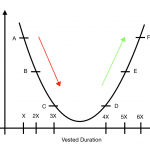
Many of us admire billionaire investors and would love to follow their investment strategies and become a successful investor. However, when we try to be like them, most of us would actually fail. Many people have used their big names as bait to lure new investors to buy into Warren’s shares or Berkshire Hathaway? In this post, we will reveal to you guys out there why is it no longer viable to follow their investment strategies and why we should be almost completely opposite from their strategy.
Companies are already “overpriced”
In the earlier decades of the stock market, fewer people are exposed to the understanding of stock trade. Furthermore, transactions are often done via tedious methods, hence there was a lot of inertia and pre-requisite knowledge. In modern times, information is widely available, in fact, most of these information are pushed to us so that we can give attention to them. As a result, many good opportunities in the markets are already priced in by market experts and algorithms managed by the finance industry.
In that case, it will be more viable for us to be traders than investors. However, we can always tap on matured companies for their stable yields if we want stable income streams. The point I am trying to make is that it is no longer viable for one to invest long term when the markets are in long term consolidation.
- Shares are mostly traded rather than invested
- Overtime, traders make more than investors for most shares
- Investors can invest in growth stocks but there are few of them which are good
- Risk for investors are in terms of opportunity cost and political instability
Too many countries are in too much debt for long term growth
Almost all countries in the world are pegging their growth on debt. This means that much of their spending for R&D and expansion are afforded through loans. Since these loans are highly reactive towards interest rates, traders will decide their next mover based on political instability or rate hikes and cuts. To add, countries in Europe and Japan itself are already issuing negative yield bonds for central banks to purchase. Which means that long term debt problem is never sustainable for any economy.
The point made is to be cautious when buying in for the long term because of the debt bubble. That means that “buy low sell high” scenarios (for buy and hold for long term) are becoming more rare.
- Long term growth is unsustainable due to high national debt levels
- Stock markets are highly reactive towards political stability
- Market fluctuations make it hard for investors to buy at a low
How can we be wise investors in the Singapore Market.
There are several options when it comes to investing in Singapore. The easiest one will be dividend investing in matured or Blue Chip Companies. Such companies are well known for its slightly rising revenue and are offering attractive yields as well. Do check out our post on dividend investing and our exclusive sharing on advanced dividend investing.
I do believe that Investing is suitable for two main groups of individuals. One would be young investors with low capital or investors with a lot of capital. Either way, the aforementioned will be able to ride the market trends and still earn over time. However, for those of us out there who are looking for yields in the double digits for each share counter, do consider trading instead. The reasons are as follows
- Markets are still unstable until the next recession
- Debt levels are high but no one knows how high is too high
- Depends on your yield targets per annum
Closing Thoughts
I always find it odd for big time investors to ask everyone to buy and hold. I guess it helps with the stability of the market over time for continued growth. However, knowing that traders rely on realised profits rather than unrealised growth, it is hard to imagine markets taming its volatility in such turbulent times. Who knows, perhaps there will come a time again after a major recession when buy and hold strategy makes sense again?






